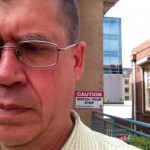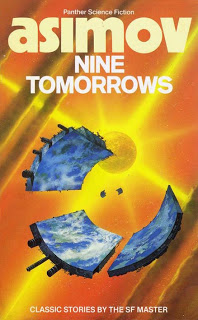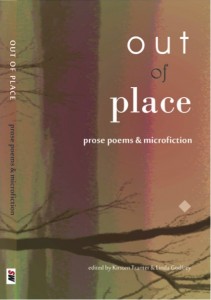 This week, we ask Wollongong-based writer, Tim Heffernan to tell us about the inspiration for his microlit piece published in Out of Place, edited by Kirsten Tranter and Linda Godfrey, about writers he admires and about endings. As Tim says, he is a serial ‘spineless wonder’ which is why we allow him, this once, to quote a poem on this short story blog! To read Tim’s piece and other great microlit, click the Out of Place cover below.
This week, we ask Wollongong-based writer, Tim Heffernan to tell us about the inspiration for his microlit piece published in Out of Place, edited by Kirsten Tranter and Linda Godfrey, about writers he admires and about endings. As Tim says, he is a serial ‘spineless wonder’ which is why we allow him, this once, to quote a poem on this short story blog! To read Tim’s piece and other great microlit, click the Out of Place cover below.
What inspired you to write the piece of micro literature which will appear in Out of Place? How would you describe this form of writing?
I have been involved in the Lyrikline Collaboration project, curated by The Red Room Company, with my friend Haider Catan, translating Arabic Poetry into English. Catching up for a cup of tea one day, Haider related a conversation: his housemate, very interested in expanding his knowledge of the Middle East, said to Haider, ‘So, there are no butterflies in Iraq?’
This line stayed with me, and not long after I was at the computer while also watching a one day cricket international. The poem came very quickly, because it coincided with Obama’s Great Barrier Reef speech, the response from Julie Bishop and the fact that I was in the middle of painting our bathroom.
This form of writing is like a seed – it is small and contained – then it germinates. It is also like the yeast that turns malt into beer. As Paul Kelly sings, ‘From little things big things grow.’
How do you know the point at which a piece you are writing should end? Do you have any favourite closing line/s from your own work or from another writer? If so, which ones and why?
Because this poem was written very quickly in response to current vibrations, I had thought I would have to come back and make it longer or more interesting. But when I came back I discovered a completeness.
I like last lines that bite or suggest. At the end of ‘Slaughterhouse 5’, after the horror of the fire-bombing of Dresden, Kurt Vonnegut finishes:
“Birds were talking.
One Bird said to Billy Pilgrim, ‘Poo-tee-weet?’”
It is just perfect – hopeful, yet it is a nervous bird, knowing that the future can never be the same.
One of my poems, ‘Kerbside Collection’ (http://cordite.org.au/poetry/creativecommons/kerb-side-collection/), finishes:
“This sentence.”
I hope it too invites the reader to reflect on a future that is built on the broken things that are the reality of living.
In 1959, the year of my birth, Isaac Asimov published a short story, ‘All the troubles of the world’ in the collection ‘Nine Tomorrows’. A future see-er, Asimov foretells the death of the internet (as if he could do that!), when the computer Multivac tires of hosting all the world’s troubles:
“And there was a clicking and a card popped out. It was a small card. On it, in precise letters, was the answer: “I want to die.”
That’s pretty good.
Tell us about some of the writers that you’ve loved in the past and who you are reading now.
I’m into writers who explore space beyond the normal. Enid Blyton, W.E. Johns, Isaac Asimov and Ray Bradbury taught the young me about other worlds. Charles Bukowski and Kurt Vonnegut are very special, as is Shakespeare, especially Lear and Richard III. I like the mad writers: Elizabeth Jolley, Thea Astley, David Ireland, Tim Winton, Peter Kocan. There are many poets who see the world differently – in ways that I connect to. My friend, South Coast poet, Mark Miller is a beautiful imagist. Then there are the musicians – Archie Roach, Ruby Hunter, Shane Howard, Gurrumul, Joe Cocker and Dr Feelgood.
Recently, I’ve gone back to Asimov’s ‘Nine Tomorrows’. His work is revelatory.
Right now I enjoy reading the Arabic poems that Haider has translated and sends to me for a bit more work. We two understand that the poetry from the cradle of civilisation is the thing that will bring us together.
Jean Dammu is an Iraqi poet who came to Australia, only to live and die on the streets. I’m moved by his work:
“He lived with a heart full of land mines
all through his life.
In a summer full of secrets and talisman
he discovered a canary
living under the moist wound.”
‘Untitled’, Jean Dammu
What you do if you haven’t written anything in a while and you want to get started writing again? Share one of your favourite writing exercises with our readers.
Forget writing. Go and do the things you need to do. All of a sudden you will see something, hear something, that stays in your head and grows.
Miroslav Holub said it most beautifully:
The Door
Go and open the door.
Maybe outside there’s
a tree, or a wood,
a garden,
or a magic city.
Go and open the door.
Maybe a dog’s rummaging.
Maybe you’ll see a face,
or an eye,
or the picture
of a picture.
Go and open the door.
If there’s a fog
it will clear.
Go and open the door.
Even if there’s only
the darkness ticking,
even if there’s only
the hollow wind,
even if
nothing
is there,
go and open the door.
At least
there’ll be
a draught.

